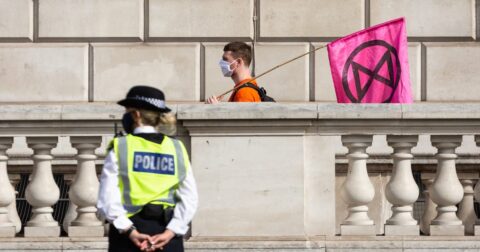Explainer
The Causes and Effects of Deforestation, Explained
Climate•8 min read
Perspective
Many of the promises made at COP26—like the pledge to end deforestation—won't be possible until we all start eating less meat.

Perspective • Climate • Food

Words by Jack McGovan
“Blah blah blah” has become the unofficial catchphrase of COP26, the most recent UN climate conference, as an expression of frustration towards our world leaders. Climate activists like Vanessa Nakate and Greta Thunberg, who coined the catchphrase, are fed up with the promises and pledges that are used as a smokescreen by politicians who don’t want to take the radical actions that are necessary to stem the flow of carbon into the atmosphere.
This year, more than 100 countries pledged to end deforestation by 2030, creating a nice, shareable headline and plenty of uncertainty. A similar commitment was already made in 2014 when 200 countries agreed to halve deforestation by 2020, and eradicate it by 2030. As is perhaps expected, these goals were not completed, nor are they on track to be. If nothing changes, then a subsequent pledge will likely be made in another seven years, when the Earth resembles an ecological wasteland even more so than it already does today.
There are many different reasons why trees are torn to the ground across the globe, but meat consumption is the leading one. Though all causes of deforestation must be appropriately addressed—whether it’s the clearing of land to mine for precious metals, or to make space for palm oil plantations—any commitments to protect our forests must consider animal agriculture. This is especially true as meat consumption is expected to rise in the coming decades.
Yet many countries, especially those with the highest burden to change, seem unwilling to handle a controversial topic like meat. Thomas Vilsack, the U.S. secretary for agriculture, claimed that Americans don’t need to reduce their meat intake to tackle the climate crisis, despite President Biden having agreed to the deforestation pledge. The UK government, only two weeks before pledging, declared that they “don’t want to dictate consumer behaviour,” after a report published by them suggesting that consumers reduce their meat consumption was deleted. This is not the kind of rhetoric that is to be expected from governments who are serious about tackling the issue of deforestation.
The obvious conclusion is that they don’t really intend to meet the demands of the pledge, and that it really is all just blah blah blah. In the case of Johnson’s government, despite their comments to the contrary, they aren’t actually opposed to telling people what to eat. An investigation by DeSmog found that an organization linked to the government ran a £1.5 million campaign to “help those reducing meat and dairy consumption to reconsider their choice.” Needless to say, claims that they aren’t interested in encouraging people to change their diets are somewhat weaker when they’ve actively funded a propaganda campaign doing exactly that.
What actually makes the UK government uneasy is the prospect of losing voters in the next election. A recent poll by the University of Cambridge found that 47 percent of Brits surveyed ate meat several times a week, and the majority—55 percent—opposed a meat tax, despite most being concerned about climate change. Targeting meat consumption, despite being necessary for tackling deforestation, is politically unpopular. This is largely the reason why governments will fail to meet their deforestation goals—they will never make decisions that prioritize the planet if it means losing their grip on power.
That’s not necessarily to say that voters are to blame. A similar poll by Kantar Public, which collected data from 10 countries around the world, found that only 18 percent of respondents thought of reducing meat consumption as “very important” for preserving the planet. What this demonstrates is that there is a widespread lack of understanding of the impact animal agriculture has on the environment, which is blocking the kind of action that could help governments to meet their deforestation pledges.
This is, in large part, not a mistake. In the same way that fossil fuel companies have played a key role in spreading misinformation about oil, gas, and coal, multinational livestock corporations have actively greenwashed their products. Research released earlier this year found that many livestock corporations had spent similar amounts of money to Exxon Mobil on political lobbying in the U.S. since 2000. Even so, this doesn’t change the fact that eating meat is a widely popular activity, and that there is opposition to implementing policies that might reduce consumption. Under these conditions, politicians aren’t going to target meat, because it would be political suicide to do so.
This exposes the link between system-level policy changes and individual actions. A concrete example can be seen in Berlin where university canteens went mostly vegan this year due to concerns over the environmental impacts of animal agriculture. This was not imposed on students—13.5 percent of Berlin’s student population identifies as vegan, in comparison to 1.6 percent of the wider population. This change only happened because enough students had made individual choices within their own lives, which, in turn, led to a transformation in social norms within the university.
Replicating this on a mass scale and popularizing concrete policies that can have a real impact on stopping the climate crisis is the only way to ensure governments meet their deforestation targets. Politicians only respond to threats to their power and influence, and while protests are a great way of bringing topics to the table and showing dissent, it is ultimately voters who decide what’s important. Until there is a mass consensus among the general populace that there is a willingness to change behaviors and boycott destructive industries to save the planet, the status quo will remain unchanged.